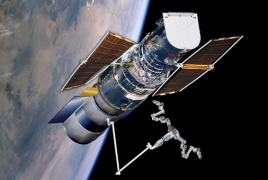Current theories might be wrong about how a galaxy evolves June 24, 2017 - 12:09 AMT PanARMENIAN.Net - With the help of NASA's Hubble Space Telescope, researchers made a surprising discovery that goes against what we thought we knew about old galaxies and how they evolve, Engadget said. Our galaxy, the Milky Way, is a disk-shaped spiral galaxy. Typical of this shape of galaxy, the Milky Way's stars move around with predictable regularity and new stars are being formed throughout. From astronomers' observations, older galaxies that have stopped producing stars take on an elliptical shape with star motions that are unpredictable, different from the Milky Way and other younger galaxies. However, scientists recently got a look at the MACS2129-1 galaxy, a "dead" galaxy that stopped making stars billions of years ago. But instead of being the expected elliptical shape, it was a flat disk much like the Milky Way. It's half the size of our galaxy, but three times as massive and spinning twice as fast. Researchers were able to see this galaxy by combining the power of the Hubble telescope with gravitational lensing -- a process by which the gravity of massive celestial objects like galaxies can magnify and stretch light from objects behind them, creating a lens. A galaxy cluster lying between us and MACS2129-1 served as the gravitational lens in this case, allowing scientists to look deep inside the dead galaxy. Now researchers have to figure out how dead disk-shaped galaxies evolve into elliptical ones, and the answer could be mergers. The merging of multiple galaxies could shuffle the star motions and plump out the shape of the resulting galaxy, Engadget said. Researchers hope to use NASA's upcoming James Webb Space Telescope to find more examples of this type of dead galaxy. Azerbaijani authorities report that they have already resettled 3,000 people in the Nagorno-Karabakh town of Stepanakert. On June 10, Azerbaijani President of Azerbaijan Ilham Aliyev will leave for Turkey on a working visit. Azerbaijani President Ilham Aliyev arrived in Moscow on April 22 to hold talks with Russian counterpart Vladimir Putin. Authorities said a total of 192 Azerbaijani troops were killed and 511 were wounded during Azerbaijan’s offensive. Partner news |